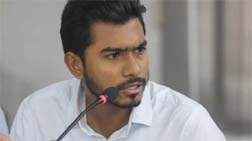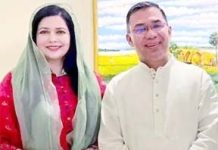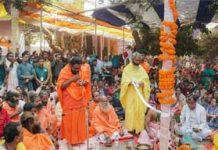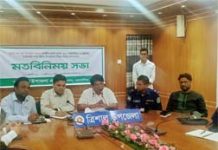C T Online Desk: Detectives have found that Gono Odhikar Parishad President Nurul Haque Nur was in close contact with at least six of the key coordinators of the quota reform movement and suggested some political demands they should press, centring the complete shutdown enforced on July 19.
They questioned Nur on various issues related to the movement during his five-day remand in a case filed over the vandalism and arson attacks on Setu Bhaban at Mohakhali. Detectives allege that Nur instigated violence during the movement last week that claimed dozens of lives and left several thousand people injured. Massive destruction of public property was also committed.
Based on his suggestions, the student leaders pressed eight demands as preconditions to negotiate quota reforms when the government representatives, led by Law Minister Anisul Haq, sat with them after fatal clashes across the country on July 18.
Education Minister Mohibul Hasan Chowdhury Nowfel and State Minister for Information and Broadcasting Mohammad A Arafat were also present at the meeting, which was held after midnight. But the students rejected the government’s request to withdraw their shutdown program.
Nur spearheaded the anti-quota movement of 2018 and later became vice president of the Dhaka University Central Students’ Union (Ducsu) in 2019. He formed the political party in 2021.
He also served as the deputy human resources secretary of the Chhatra League’s Haji Muhammad Mohsin Hall unit in 2015 but quit the party after failing to get higher posts in the hall or central committees.
Detectives say Nur suggested to Nahid and Sarjis that they press demands like the ouster of the government, resignation of the home minister, arrest of Chhatra League members involved in violence, opening educational institutions, and activating the Internet. He also called upon the agitators to participate in the shutdown program and continue the agitation till the fall of the present government.
Investigation Officer Inspector Abu Said Mia of the DB’s cantonment zonal team, told the court that Nur had maintained contact with Nahid Islam, Hasanat Abdullah, Sarjis Alam, Asif Mahmud, Akhtar Hossain and Ahnaf Said Khan since June 5, when the students first staged demonstrations against the High Court order reinstating the quota system, which was abolished through a government circular in 2018.
Nur had discussions with Nahid and Sarjis on July 17 and 18, the IO said. At 10pm on July 18, the duo had a discussion on their mobile phones and via SMS on ways of overthrowing the incumbent government.
Then Nahid and Sarjis messaged him and asked Nur to write down the demands.
Of the coordinators, Nahid, Asif and Ahnaf were former leaders of Chhatra Odhikar Parishad’s Dhaka University unit. In July last year, Asif and Ahnaf resigned from the committee, while Nahid formed a new platform named Democratic Student Force (DSF) on October 4 after a split in Gono Odhikar Parishad.
The quota movement began under the banner of general students of Dhaka University on June 6—a day after the High Court declared the abolition of the quota system in 2018 illegal. The students placed four points, including the abolition of the quota system in all grades of government jobs as ensured by a circular in 2018. They also gave the government time until June 30 to meet their demands.
The students resumed agitations at different universities on July 1, and the coordinators formed an open platform—Students Against Discrimination—on July 8, when their demonstrations occupying Shahbagh intersection gained the support of the masses and opposition political parties.
On that day, Nahid declared their one-point demand, asking the government to pass a law in Parliament by keeping a quota for the backward communities.
Apart from Nur’s Gono Odhikar Parishad, the BNP, AB Party, Ganatantra Mancha, Jatiya Party, Islami Andolan Bangladesh, and student groups like the Chhatra Federation and Jatiyatabadi Chhatra Dal also expressed support for the movement.
Among them, the top leaders of the BNP and Chhatra Dal had asked the agitating students to oust the government through the movement.
Before the general election of January 7, Nur’s Gono Odhikar Parishad was part of Ganatantra Mancha—a platform of seven political parties waging an anti-government movement simultaneously with the BNP-led combine of around 70 parties. However, Nur left the platform in January last year because he felt neglected.
Court proceedings
After placing his arguments, the IO requested the court of Dhaka Metropolitan Magistrate Shakil Ahmed to keep Nur in jail until the investigation of the case was over.
Earlier, lawyer Biplab Poddar and many others applied for bail on behalf of Nur. Around 3:40pm, Nur was taken to the courtroom from court custody.
Then the lawyers told the court that Nur could not stand in the dock. He should be seated. Later, the court ordered him to sit on the bench. During the hearing, Nur was sitting next to his wife.
The prosecution read out the charges against him and opposed his bail. After the court proceedings, Nur was taken to the judge’s chamber. There, the judge talked to him for some time. Later, the court directed the jail authorities to ensure Nur’s treatment as per prison rules and rejected the bail application.
On this day, Nur’s father, wife and sister were present in court. After the decision to send them to prison, they broke down in tears.
Earlier, another court granted Nur’s five-day remand on July 21.














